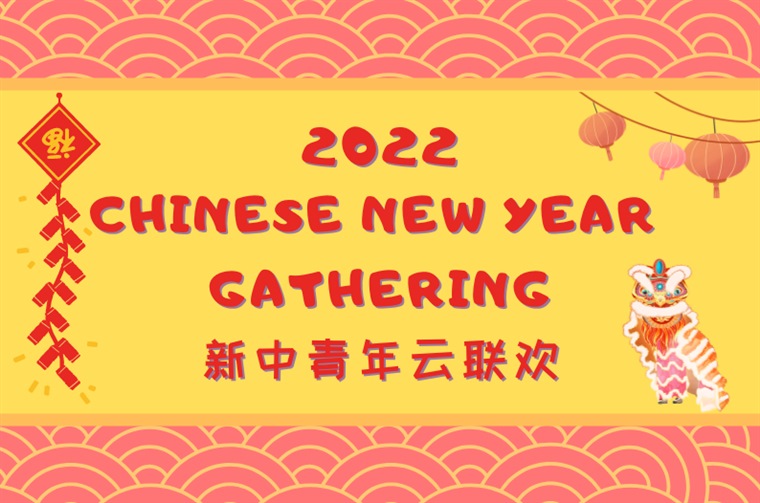-
About
-
Businesses
Forums
Programmes
Awards
-
Youths
Forums
Programmes
Scholarship/Awards
Memberships
Latest Updates
-
Resources
Forums
Programmes
Awards
Forums
Programmes
Scholarship/Awards
Memberships
Latest Updates

26 January 2022 – Since travel restrictions due to pandemic started, youths from Singapore and China have had fewer opportunities to interact due to the temporary suspension of overseas learning journeys and hosting programmes. Business China was pleased to collaborate with during the festive season to co-organise “Curious Potato Chinese New Year Gathering 2022”, which brought together nearly 80 youths from Singapore and China virtually to have exchanges about local Chinese New Year customs and practices, reunite with their peers and form new friendships.
The evening online event started with sharing about Chinese New Year customs and traditions by 8 youth speakers from Singapore and China. They provided refreshing and diverse perspectives on how various dialect groups and regions in both countries celebrate Chinese New Year.
First up was Ms Yan Zhen, the chairperson of Shandong University’s Student Union, who introduced Spring Festival customs in Eastern Shandong province, commonly known as Jiaodong Peninsula. She kick-started her sharing with a local Chinese New Year folksong, followed by introducing various local Chinese New Year practices such as dancing Yangge (秧歌), a traditional Chinese folkdance, and the making of Jiaodong Bo Bo (饽饽), a traditional Chinese steamed bun that comes in various shapes, characters, and colours, all which embody blessings for the coming new year.
Ms Cheng Wenwen, a student at Fudan University, used photographs of artisan ice lanterns and ice sculptures to take participants to the freezing northeast China. Coming from a region well-known for its food, Ms Cheng did not forget to make the participants salivate with pictures of the famous frozen pears (冻梨), pork stew, and northeast-China sauerkraut.
Mr Sung Chang Da, the founder of Hakka Scribbles, is a young Singaporean who hopes to bring greater visibility to Singapore’s Hakka heritage. Apart from showcasing Singapore as a food paradise using a slew of Hakka food for Chinese New Year, Mr Sung also shared an interesting practice in the 60s and 70s. People back then had the practice of giving live chickens to their elders a month before Chinese New Year to fatten it up and then cook it for reunion dinner on New Year’s Eve.
Ms Wu Zhuochun, a Chinese PhD student at National University of Singapore, gave attendees a glimpse into how local Sichuan youth celebrate Chinese New Year nowadays, which she jokingly summarised into four phrases: eating too much to walk, drinking too much to get out of bed, having too much fun to return home, and being too happy to stop grinning (吃得走不动路、喝得起不了床、玩得回不了家、乐得合不拢嘴)
Mr Duan Yifu, a student at Tsinghua University gave a very timely sharing on the festive atmosphere of the Beijing Winter Olympics at his hometown, Zhangjiakou. He also introduced 2 intangible cultural heritage practices in northern China – Er Ren Tai (二人台), a traditional drama performance and Da Shu Hua (打树花), a festival fire performance to celebrate the occasion and yearn for a good life.
Mr Wilson Sim, President of the Qing History Society (Singapore), gave a comprehensive overview of common Chinese New Year customs in Singapore, including do’s and don’ts, scenes during reunion dinner, regarding mandarin oranges and house visits, spring cleaning, and why Hokkiens pray to the Jade Emperor with sugar canes on the 9th day of Chinese New Year.
Lastly, Ms Gao Shanyuan and Mr Yue Shipeng from Tsinghua University discussed about the history of ancestor worship and worship etiquettes during the Spring Festival in China. They ended off with reflecting on the inextricable link between ancestor worship culture and the underlying logic that shaped and defined the development and characteristics of the Chinese civilisation.
The second segment was a bonding session, in which participants were divided into breakout rooms for a Chinese New Year Bingo Game that was tweaked to be more engaging. In this game, the participants were able to compare Chinese New Year practices with their Singaporean and Chinese peers.
The fun and interactions from the evening continued in a Wechat group set up to keep everyone connected as we anticipate more opportunities for youth from both countries to meet virtually and physically.
To keep updated on the latest youth events, follow Business China’s social media channels !